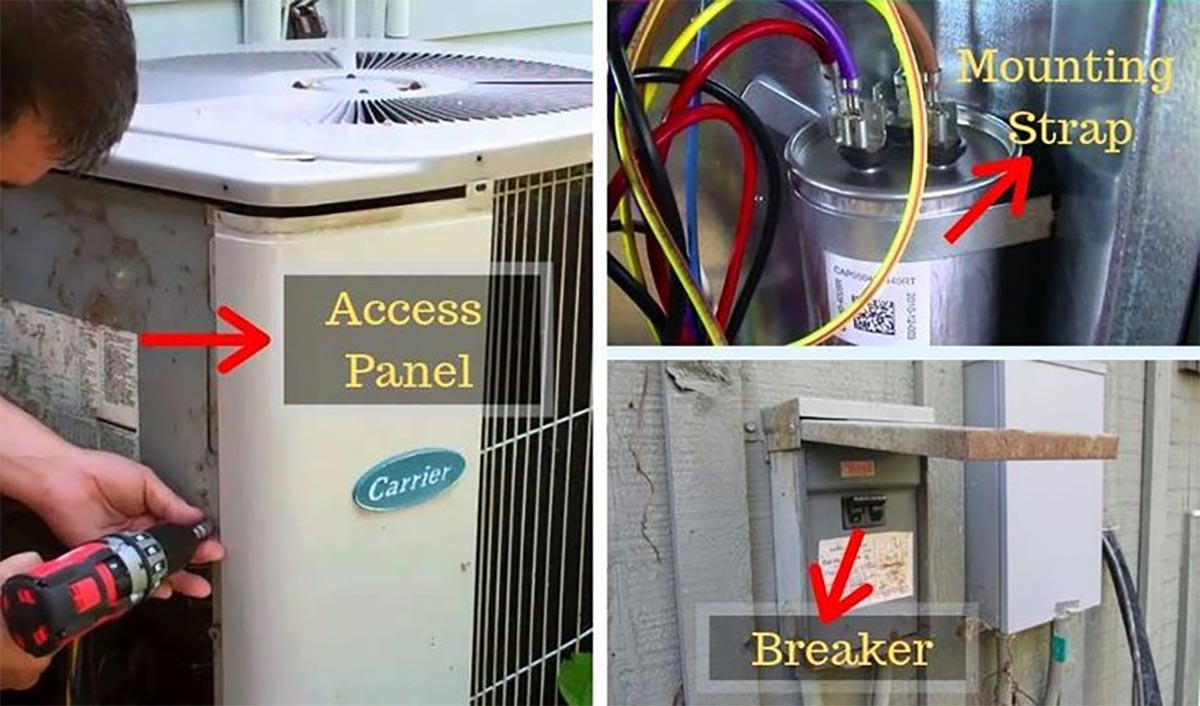Electrical problems cause close to 80% of air conditioner malfunctions, and in most of these cases, the capacitor is usually the culprit. Yes, the capacitor might be small in size. However, when faulty, your air conditioner will not function properly.
The capacitor functions like a battery—swapping electrons between two conductive plates. Because AC units cycle a lot, especially during the summer seasons, they turn on and off frequently. Capacitors are important for your air conditioner because it uses more energy than other appliances in your home. So, capacitors are designed to store energy and sort of jumpstart your unit.
If your AC capacitor starts to fail, you should replace it immediately. This helps to prevent your AC system from breaking down or malfunctioning. But, how do you know that your AC capacitor is not functioning properly?
Here are a few signs to watch out for:
- When the capacitor starts to wear out, it starts to make a loud, unusual clicking sound inside the cabinet. You should replace the capacitor immediately when you hear such a sound. This prevents the motor from burning out in case the capacitor fails to start it.
- If the capacitor fails completely, your AC’s motor will try to start, but will produce a humming sound, instead of completely starting up. This is one of the most notable malfunctions, and it’s a sign that the capacitor should be replaced immediately.
- If the capacitor connected to the compressor begins to weaken, it can make a “hard-starting” situation, where the AC struggles to start and then stops immediately. It’s important to replace the capacitor immediately when you notice this because it can make the compressor, together with other parts of the system, strain.
Now, replacing an AC capacitor on your own isn’t a hard task, and you can do it, so long as you have the right tools and materials. However, you should understand that capacitors are designed to retain the electrical current. Thus, there’s a huge risk for shock when you attempt to touch or disconnect the capacitor without first discharging the current it’s storing.
To discharge the current, you only need to draw the blade of your screwdriver across the two metal contacts. Failing to do this can put you at risk of a horrible shock. As said earlier, replacing your AC capacitor is something you can do on your own. This, however, comes with its pros and cons, which we shall discuss below.
Pros
It saves you money
Being able to replace an AC capacitor by yourself can help you save money in numerous ways. First, you will make sure that your AC unit is clean and properly fixed. Secondly, you don’t need to spend any money on hiring an AC technician to replace the capacitor. You don’t need to be a mechanical engineer to replace a capacitor or even do any basic maintenance. You only need to read the user manual to do the job correctly.
You will not let strangers into your home
Today, we always have to be careful with who we let into our homes. The Covid-19 pandemic is to blame for this, since we don’t know who’s safe and who’s not. Yes, you can still hire a technician. However, since replacing a capacitor is not a challenging task, you can keep yourself and your family safe by repairing it by yourself.
Please note the importance of this, as the Covid 19 virus is not stopping and new variants are being discovered every day. So, the information we have about the virus before is not valuable. So, allowing strangers to your home increases the risk and danger.
Replacing AC capacitor is very easy and safe
The experts from Hartman, air conditioning installation company say that replacing your air conditioner’s capacitor is one of the easiest tasks you can do by yourself without any professional assistance. You only need to have DIY skills, as well as a keen eye for detail to get the job done correctly. Also, depending on your experience and skills, you can also recalibrate the system and do other simple repairs that you notice when replacing the capacitor.
Cons
It’s very risky
As said earlier, there is a great risk of electrocution when changing your AC’s capacitor. The risk is even greater if you don’t have the right tools needed to replace the capacitor.
You can make costly mistakes
Yes, you might be a great DIY enthusiast. However, the last thing you want to be is over-confident when replacing an AC capacitor. If you are not sure how to do it, don’t touch the machine, otherwise, you risk causing additional damage which will be more costly to repair.
Besides, replacing the AC capacitor on your own can render your warranty void. Most manufacturers clearly state that every repair, even the smallest one, should be done by a professional technician. So, replacing your AC capacitor on your own can make the warranty useless before its end date.
You can get hurt
This is very possible, especially when the outdoor unit is mounted high on the wall or on the roof, and you don’t have the right safety equipment. Please note that any fall from six feet and above can lead to death or permanent injuries.
